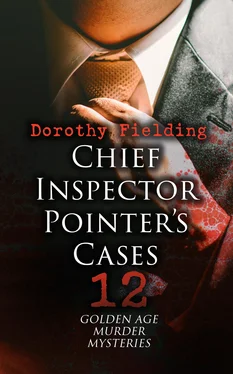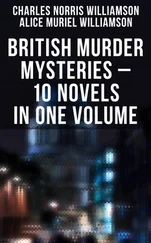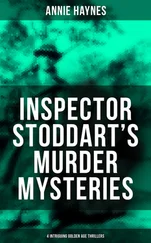"All the better if she doesn't hear them carry the coffin out of doors. Though it's really quite absurd. Giving way like this. It isn't as if they had been fond of each other. But Sib always was one to let her feelings run off With her. Now she's coming to." Lady Maxwell spoke as one who had scant sympathy with weakness.
"You are mistaken, Lady Maxwell," di Monti said in his most formal manner, "I happen to know that Miss Rose was very fond of Miss Sibella indeed. These last days especially."
"I shouldn't overdo it, if I were you," was the lady's caustic and rather surprising reply.
Di Monti looked as though he had been struck. His eyes flashed, his face crimsoned. His upstanding top-locks quivered. But he only bowed, and at that moment Pointer had to move away from the window, for Paul was looking for him.
Pointer's mind as he drove in the funeral cortège was with the two women whom he had watched in such a convulsion of feeling.
Each felt herself guilty. Was it only in some measure, or in full measure? A good deal would depend on temperament. But even allowing for the most highly strung nerves—and both Sibella and Mrs. Lane possessed that doubtful blessing, there was more here than they would explain. Some knowledge, some fact, some deed, lay behind such emotion. Of that Pointer was sure.
The afternoon of Rose Charteris's funeral was a marvel of song and bloom and scent. It was the May of the poets, of bud-swollen branches and filmy green leaves. The pink of the crab apple trees around the old churchyard showed up in spaced beauty against the wild cherries. The blackthorns reached their snowy arms, beginning to look a little ragged, from out the beautiful young green of their cousins, the hawthorns, whose blossoms were only a promise, a closely-kept secret, as yet.
The pale-green bud clusters of the hollies were just tinging into white, but a cloud of their blue butterflies—symbol and warning—swept past the mourners' faces like a delicate smoke wreath, on the first flight of their lives. A thrush sang a wonderful song as they lowered the body of Rose into the earth to which it was to return.
The service affected the men officially engaged in the hunt very keenly. There was not one who did not swear to himself a vow—by that bole in the ground, by that oblong box—to do his utmost to see that the murderer paid.
After Colonel Scarlett had dropped the first earth on to the coffin, di Monti stepped forward. From his handful came a rattle that made the clergyman peer over his prayer-book. Some stones must have got picked up as well. Di Monti did not seem to have heard them, as, with bent head, he stood beside Scarlett, a picture of mourning.
Table of Contents
POINTER had a short talk with Lady Maxwell after the funeral, but he learnt nothing fresh. She repeated her doubts about Mrs. Lane, and the fact that the colonel, when she had felt it her painful duty to speak to him on the point just now, had said that his lady housekeeper was too efficient to lose, and that if there were any mistake, it was his. He must have confused two Mrs. Seymours.
The object of the lady's suspicions was sitting very quietly in the arm-chair into which she had sunk on her return from church.
After a long time spent in thought, she walked down-stairs and into the study. The colonel, too, was sitting staring into space.
On seeing her he rose abruptly, and with a look of caution went to the door and shut it again to make sure that it was caught.
"Does she suspect anything? Lady Maxwell, I mean?" he whispered "Paul's downstairs. Those damned police are off the premises for once. Does she know anything?" he repeated irritably.
"Nothing, I think, except that I was never a companion to a Bishop's widow."
For a second Scarlett stared at her, as though she had spoken in some foreign tongue.
"Oh!" he said at last, "you mean your reference? Well, I had, to say something when the police sprang the question on me. But was that—"
She interrupted him. "I think it would be as well if I were to go to town. I don't see else—there's danger," she said in a low voice.
"Danger of having communications cut off," he finished. "I was just thinking the same when you came in. Have you thought of where to go?"
"You have a furnished house at Victoria standing empty till June. I'll go there as a sort of caretaker." She raised her hand. "Don't let's talk any more about it to-day. I feel as though," she was at the door before he had guessed her intention, "I want to be alone, for a while."
She was gone. The colonel mixed himself a stiff drink.
Pointer found Cockburn's car waiting for him at the police station. It had been waiting some time.
"Bond had to get back to town. He went by train, but I wanted to see you about something. You know that shot I heard, or thought I heard, last Thursday night?" Cockburn began briskly.
Pointer nodded.
"Well, Count di Monti's tyre burst coming back from the funeral. I heard the sound again at that moment. It wasn't a shot after all, but one of his tyres I heard go phut . They're a patent, reinforced, balloon type, of a very curious make."
"You're quite sure of this?"
"I'm prepared to swear to it. Such a sound might travel far on a quiet evening just before a storm. Anyway, that's the noise we heard and mistook for a shot." Cockburn's voice was quite definite.
Pointer turned over his latest addition to the puzzle for a minute.
"You see," he explained—Cockburn was talking to him in his own sitting-room, "the trouble is that Count di Monti has a very good alibi for the hours from eight on Thursday till Friday morning. Prince Cornaro and a Signor del Greco are prepared to swear that he was in their company from dinner till the meeting of Italian Fascisti, which took place at eleven, and afterwards till ten the next morning, or a little after. They're both very definite and very positive. The head waiter at Frasati's bears out the dinner hour as eight. The count most certainly spoke at the meeting. For the rest of the time we have to rely on the honour of the two gentlemen."
Cockburn nodded in his turn. He was listening very seriously. "I quite understand all that. But can't the alibi be tested?"
"I don't mind saying that it's so good it's suspicious."
"That's what I think. Now, Mr. Thornton, it seems, knows a Cavaliere Rossi, the London correspondent, for the best Italian papers. An anti-Fascist. He might be able to tell us something about di Monti and Thursday night."
Pointer heartily commended this idea.
Armed with a letter, and preceded by a telephone message from Thornton to the Cavaliere, Cockburn sped up to the Italian's club.
Rossi turned out to be a tall, good-looking young man with a merry, dark eye. He burnt Thornton's little note in the wood fire.
"Have a cocktail of my family Vermouth while we talk. This corner is absolutely safe from eavesdroppers and, what is more difficult to secure in England, and much more important, from draughts. Now, what do you want me to tell you about di Monti?"
"Oh, all sorts of things. First of all, what is his position here?"
"Slippery. If the Ambassador likes, he can disown him. If he likes, he can throw his mantle over him, and then you won't be able to touch him."
"I can hardly imagine a war over that chap! But which way would his Excellency's preferences run?" Rossi bent forward in mock intensity.
"It depends on how much there is to throw his cloak over. A little heap of political trouble or a great mound of it. It would stretch in the one case, but not in the other. At least, that is how things seem to stand. Di Monti is on a mission, straight from our 'Musoon.' Sent to organise the Italian Fascisti in London. The anti-Communists, that is—."
Читать дальше












